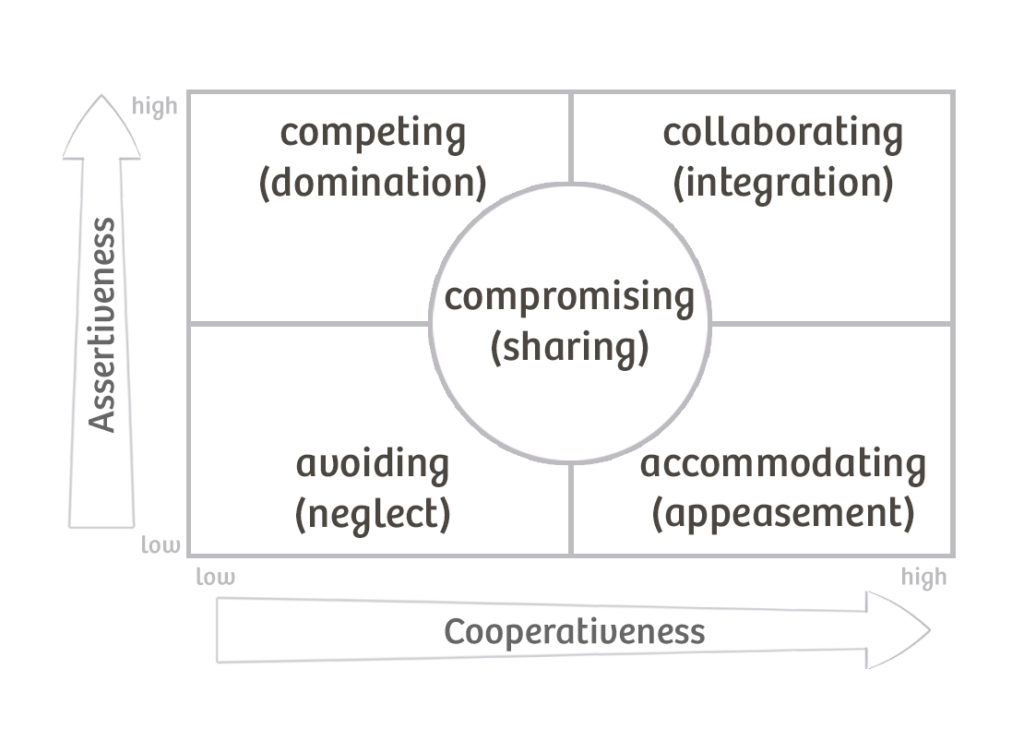What It Is:
The Thomas-Kilmann Conflict Mode Instrument (TKI) is a widely used tool for assessing individual preferences for handling conflict. Developed by Kenneth W. Thomas and Ralph H. Kilmann, the TKI identifies five conflict-handling modes based on a dual concern model of behavior:
- Competing (Assertive and Uncooperative):
- A mode where individuals pursue their own concerns at the expense of others. It involves taking a firm stance, standing up for one’s rights, and pushing for one’s position.
- Collaborating (Assertive and Cooperative):
- Involves working together to find a solution that satisfies the concerns of all parties. It requires open communication, mutual understanding, and joint problem-solving.
- Compromising (Intermediate Assertiveness and Cooperativeness):
- Individuals seek a middle-ground solution that partially satisfies everyone’s concerns. It involves a willingness to give up some of one’s goals to achieve a resolution.
- Avoiding (Unassertive and Uncooperative):
- This mode entails evading or sidestepping the conflict without addressing the issues directly. Individuals might withdraw from the situation, postpone discussions, or remain neutral.
- Accommodating (Unassertive and Cooperative):
- Involves prioritizing the concerns of others over one’s own. It includes making concessions and fostering harmony in relationships.
How to Use It:
Using TKI in Agile Coaching:
- Conflict Resolution Workshops:
- Conduct workshops with the Agile software delivery team to introduce the TKI and help team members understand their preferred conflict-handling styles. Discuss how different styles can be effective in various situations.
- Team Building and Collaboration:
- Use the TKI results to enhance team building and collaboration. Teams can explore how to leverage each member’s preferred conflict mode to address challenges and promote healthy communication.
- Customized Communication Plans:
- Develop customized communication plans based on individuals’ conflict-handling preferences. For instance, if team members prefer competing, provide opportunities for them to express their opinions assertively.
- Conflict Scenario Role-Playing:
- Facilitate role-playing exercises where team members can practice using different conflict-handling modes. This helps build awareness and provides a safe environment for experimentation.
- Mediating Team Disputes:
- In situations of team conflicts, the Agile coach can use the TKI to mediate disputes. By understanding each team member’s preferred style, the coach can guide discussions toward a resolution that considers diverse perspectives.
References:
- Official TKI Website:
- The official Thomas-Kilmann Instrument website (kilmanndiagnostics.com) provides information about the tool, its applications, and resources for individuals and organizations.
- Books and Publications:
- Explore books and publications by Kenneth Thomas and Ralph Kilmann that delve into conflict resolution, collaboration, and the application of the TKI. “Thomas-Kilmann Conflict Mode Instrument” (2007) is a comprehensive resource.
- Training Programs and Workshops:
- Look for training programs and workshops on conflict resolution that incorporate the TKI. These programs may offer hands-on experience and practical strategies for applying conflict-handling modes.
- Professional Development Courses:
- Enroll in professional development courses that focus on conflict resolution and interpersonal skills. Such courses often integrate the TKI as a valuable tool for understanding and managing conflicts.
Visit the Agile Coach’s Toolkit for more definitions, models, theorems and stuff.

